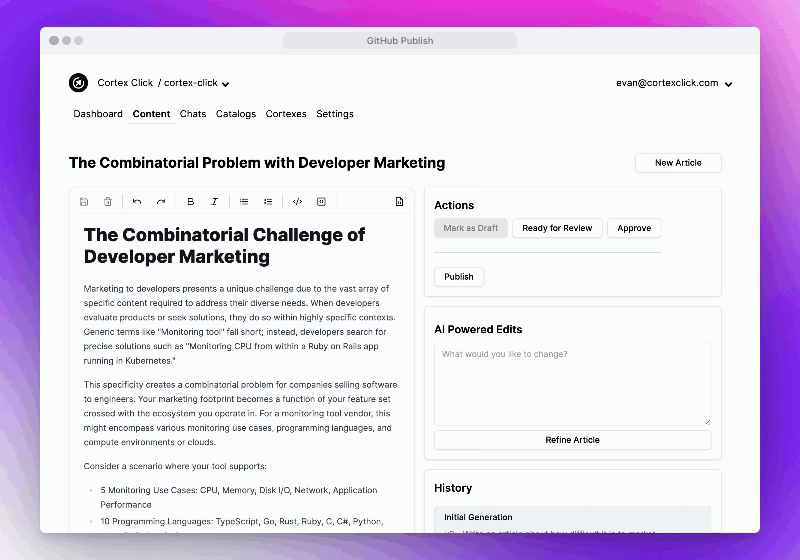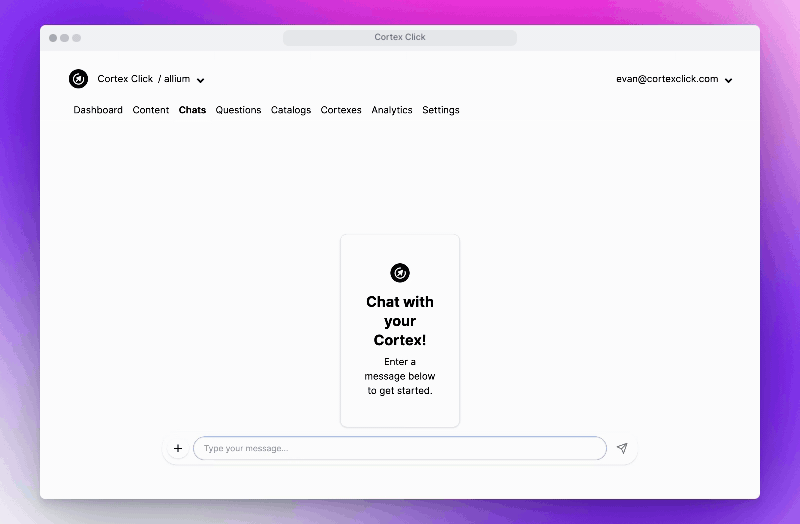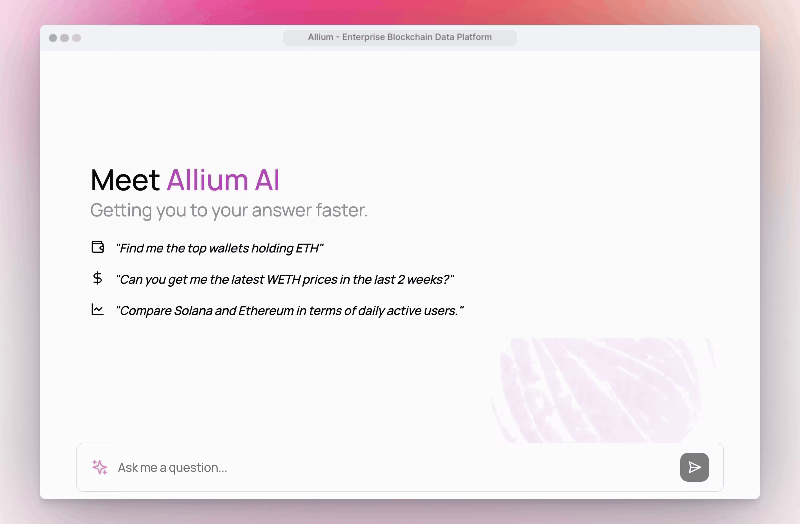Introducing Cortex Click: The LLM-Driven Developer Marketing Platform
Evan Boyle
Today we’re launching Cortex Click, an LLM-driven platform for creating high quality developer marketing content including blog posts, tutorials, documentation, copilots for product onboarding and much much more. Leading developer-focused startups like Temporal, Pulumi, and Allium are using Cortex Click to produce trustworthy content that drives growth.
Building a great product is half the battle, and the other half is marketing. I've spent my entire career working on developer tools, and I've learned first hand that communicating and writing about a product is one of the hardest challenges technical founders face. Content is on the mind of every technical founder, and they just can’t produce it fast enough and a level of quality that meets (nay, exceeds!) the bar. And it’s not just founders: even dedicated staff like marketers struggle with producing high quality technical writing that has impact.
In theory, LLMs are an exciting solution to this problem. But as most readers can probably attest, the LLM writing tools we have today just don’t get the job done. They hallucinate, generate generic content that isn’t personalized to your product, and lack the supporting infrastructure for iterative, collaborative work – which is what good writing is all about.
We built Cortex Click to be the writing assistant that we always wanted. It’s specifically designed to generate and iterate on personalized, high quality technical writing.
"Cortex Click allows our team to scale technical content creation for our developer focused products with just one person using their generative AI platform."
-- Ethan Chan, CEO of Allium
We've found that the Cortex Click Intelligent Content Engine drastically cuts down the time to create quality technical content, and our customers see it too.
"SEO teams can cut content production time by 75% with Cortex Click."
-- Matt Bowers, SEO consultant and former head of SEO at Zapier and Zillow
Cortex Click: The Intelligent Content Engine
The last thing the world needs is another platform for generating boring, generic, subpar content ("slop" in the parlance of our times). Cortex Click is built for the exact opposite purpose: to give founders, developers, marketers, and their teammates a customized, tunable platform where they can create their best writing.
We believe that quality really matters in documentation, blogs, and marketing. To generate the highest quality content possible, we employ a three-pronged strategy:
- Grounding in your Knowledge Base: Cortex Click searches across your existing developer docs, blog posts, code examples, and other marketing materials to ground content generation, add cross-links, and match brand voice. Further, we automate the process of ingesting your knowledge base, and keeping it up to date so your audience is guaranteed the freshest content.
- Real-Time Web Research: To fill in any gaps, the workflow performs web research against popular search engines. This augments your knowledge base with access to additional code examples, industry trends, and other facts and statistics.
- Multi-Agent, Adversarial Workflow: All of this context is fed into multiple frontier models from different providers that are used in concert. We leverage the strengths of different models to plan, research, draft, review, and correct the content ultimately leading to a better result than could be achieved with any one model.
Just provide a title and brief prompt, and Cortex Click generates a first draft. During generation, we index your knowledge base, and perform real-time web research to supplement any topics that might be missing.

All of the above helps the first draft of whatever you're producing be more accurate and compelling. But writing is an iterative process, and a good copilot needs to help with that too. Cortex Click is built for draft number 2,3,4 and on:
- Editable in markdown
- Highlight and refine
- Version controlled
Highlight any piece of text in the article and hit ⌘ K to refine it with AI. You can choose from builtin options like spell check, expand, and shorten, as well as open-ended natural language prompting.

The author is put in complete control, and has the option to accept, reject, or regenerate the suggestion until pleased with the output.
You can prompt to generate an entirely new section by hitting ⌘ K on any newline.

You can even pass links into prompts, and ask Cortex Click to make changes based on the contents. The engine fetches the page and extracts out the necessary data to feed to the rest of the generative workflow.

This is great for pulling in external references like code examples and style guides, and can even be used to match the formatting or tone of the content within the reference URL.
If you're working on something that doesn't yet exist in your knowledge base, like a new product launch, you can upload context documents to inform generation.

Upload PRFAQs, code examples, OpenAPI specs, and more to bootstrap your content.
Publishing a Pull Request
Many modern teams build their content – think marketing sites, docs, and blog – with some sort of Markdown builder like Hugo, Docusaurus, or GitBook. The Cortex Click GitHub app enables publishing content created within the Cortex app as a GitHub pull request with one click.

With the GitHub app, Cortex Click natively integrates with your existing content workflows like Vercel preview builds, linting, and deployments on merge via GitHub actions.
AI-Assisted Content Review
Imagine an engineer submits a PR to add docs for a feature they just built, and adds you as a reviewer. When you review a pull request you typically have two options when you encounter something you’d like to see changed:
- Add a comment and leave it to the PR author to do the work to incorporate the feedback.
- Take extra time to craft a suggested commit with the changes you’d like to propose.
With the Cortex Click GitHub app, all you have to do is tag @cortexclick in your review comment and you get a suggested commit instantly, reducing the amount of work required by both the PR reviewer and author to incorporate feedback into a piece of content. All of which translates to better documentation in less time.

Chat
Cortex Click includes a simple authenticated chat interface. This is great for tasks like brainstorming blog post ideas, and generating Linkedin and Twitter copy, but customers have put it to use far beyond what we initially expected. It turns out that your knowledge base is useful for everything from internal use cases like new employee onboarding, customer support, and sales automation, to external use cases like product Q&A.

Companies like Allium have built custom in-product copilots using our streaming chat SDK. Their users ask questions to the copilot to translate natural language questions into SQL queries that are grounded in their database schemas and developer docs - all powered by the Cortex Click SDK:

Try the copilot out yourself on the Allium landing page.
Content Governance
One of the biggest challenges with using LLMs in go-to-market is making sure that content is consistent, follows brand guidelines, and is tailored to the use case. We've solved this problem by creating three primitives:
- Organization Settings: The ability to set controls over brand voice, rules about off-limit topics, and other guidance that applies globally to all generated content.
- Catalogs: A system for organizing, ingesting, and keeping your knowledge base up to date in a clean format that is ready for consumption by LLMs.
- Cortexes: A Cortex is an "agent" for a specific use case. You can create many of them, and each can access one or more catalogs of data for grounding, and specify rules and instructions for the use case whether that be formatting instructions for tutorial content, or programmed refusals for customer support scenarios.
We've heard from our design partners that a lack of guardrails is the biggest concern with shadow LLM use and have designed a model that maximizes the benefits while still maintaining control.
Getting Started
We don't want you to take our word for it or go through some sort of onerous "contact us" sales process. Personally, we hate being driven through sales teams to kick the tires on a product. Try it out and see the magic for yourself. We offer a free trial - no credit card required.
Onboard and Ingest your Knowledge Base in 30 seconds
One reason so many LLM GTM products require "contact us" onboarding is that the process of ingesting a knowledge base is hard. We've put a ton of effort into simplifying this, and you can get started using our product in under 30 seconds.

Just enter your website URL, and we'll ingest all of your docs, blog posts, and marketing materials automatically. Sign up for a free trial and generate your first piece of content within minutes.
Pay-as-you-go Pricing
We believe that everyone should benefit from AI. That's why Cortex Click offers pay-as-you-go pricing. We want to help you grow your business, and grow our relationship together.
We have plans for teams of all sizes. Learn more on our pricing page.
Just the Beginning
This launch comes on the six month anniversary of founding the company. It is truly amazing what a team of a few principal engineers can accomplish with the help of LLM-driven developer tools. We're bringing the same gains to technical content and the world of developer marketing.
We believe that software should be easy to use. Users should have answers to their questions readily available, supported by high-quality documentation that simplifies the onboarding process. Regardless of whether a company has a large content marketing team or not, every product deserves top-notch documentation and marketing materials. We're building Cortex Click because the way the industry creates developer content is flawed, slow, and broken. Today we're sharing the first step towards a future where developer content is generated in real time as you ship new features, and content is updated automatically before it has the chance to get stale. Come along for the journey.
